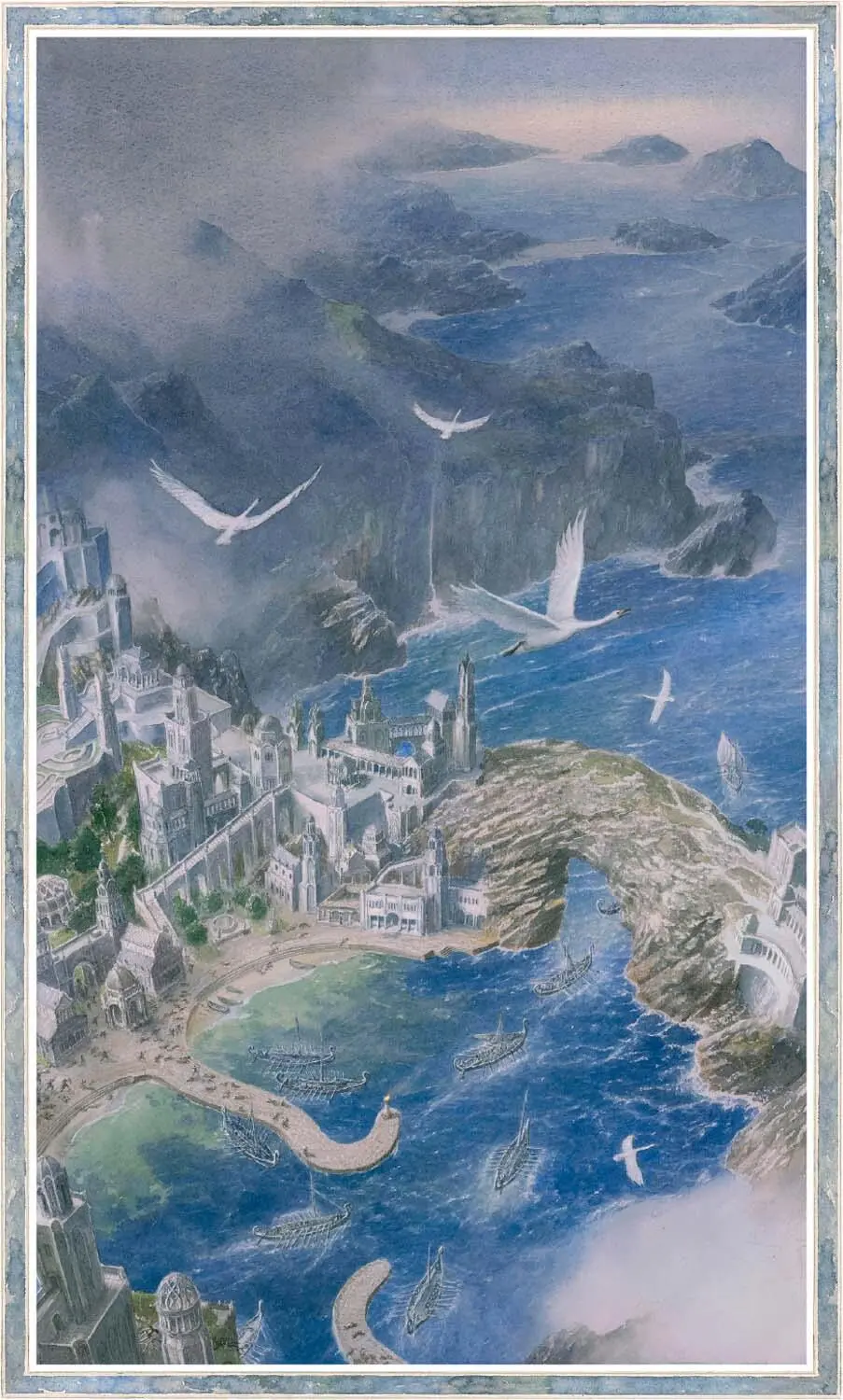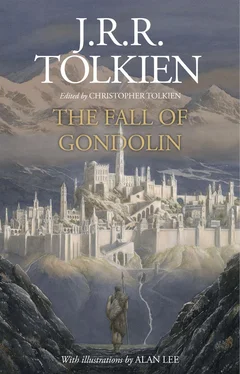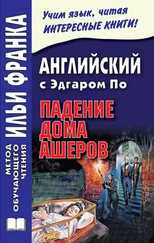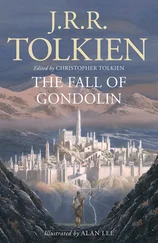Tulkas is sent to put Morgoth in chains once more, but he escapes through the pass of Kôr into the dark region beneath the feet of Taniquetil called Arvalin, where the shadow is thickest in all the world. There he finds Ungoliant, Gloomweaver, who dwells in a cleft in the mountains, and sucks up light or shining things to spin them out again in webs of black and choking darkness, fog, and gloom. With Ungoliant he plots revenge. Only a terrible reward will bring her to dare the dangers of Valinor or the sight of the Gods. She weaves a dense gloom about her to protect her and swings on cords from pinnacle to pinnacle till she has scaled the highest peak of the mountains in the south of Valinor (little guarded because of their height and their distance from the old fortress of Morgoth). She makes a ladder that Morgoth can scale. They creep into Valinor. Morgoth stabs the Trees and Ungoliant sucks up their juices, belching forth clouds of blackness. The Trees succumb slowly to the poisoned sword, and to the venomous lips of Ungoliant.
The Gods are dismayed by a twilight at midday, and vapours of black float in about the ways of the city. They are too late. The Trees die while they wail about them. But Tulkas and Oromë and many others hunt on horseback in the gathering gloom for Morgoth. Wherever Morgoth goes there the confusing darkness is greatest owing to the webs of Ungoliant. Gnomes from the Treasury of Finwë come in and report that Morgoth is assisted by a spider of darkness. They had seen them making for the North. Morgoth had stayed his flight at the Treasury, slain Finwë and many of his men, and carried off the Silmarils and a vast hoard of the most splendid jewels of the Elves.
In the meanwhile Morgoth escapes by Ungoliant’s aid northward and crosses the Grinding Ice. When he has regained the northern regions of the world Ungoliant summons him to pay the other half of her reward. The first half was the sap of the Trees of Light. Now she claims one half of the jewels. Morgoth yields them up and she devours them. She is now become monstrous, but he will not give her any share in the Silmarils. She enmeshes him in a black web, but he is rescued by the Balrogs with whips of flame, and the hosts of the Orcs; and Ungoliant goes away into the uttermost South.
Morgoth returns to Angband, and his power and the numbers of his demons and Orcs becomes countless. He forges an iron crown and sets therein the Silmarils, though his hands are burned black by them, and he is never again free from the pain of the burning. The crown he never leaves off for a moment, and he never leaves the deep dungeons of his fortress, governing his vast armies from his deep throne.
When it became clear that Morgoth had escaped the Gods assemble about the dead Trees and sit in the darkness stricken and dumb for a long while, caring about nothing. The day which Morgoth chose for his attack was a day of festival throughout Valinor. Upon this day it was the custom of the chief Valar and many of the Elves, especially the Quendi, to climb the long winding paths in endless procession to Manwë’s halls upon Taniquetil. All the Quendi and some of the Noldoli (who under Fingolfin dwelt still in Tûn) had gone to Taniquetil, and were singing upon its topmost height when the watchers from afar descried the fading of the Trees. Most of the Noldoli were in the plain, and the Teleri upon the shore. The fogs and darkness drift in now off the seas through the pass of Kôr as the Trees die. Fëanor summons the Gnomes to Tûn (rebelling against his banishment).
There is a vast concourse on the square on the summit of Kôr about the tower of Ing, lit by torches. Fëanor makes a violent speech, and though his wrath is for Morgoth his words are in part the fruit of Morgoth’s lies. He bids the Gnomes fly in the darkness while the Gods are wrapped in mourning, to seek freedom in the world and to seek out Morgoth, now Valinor is no more blissful than the world outside. Fingolfin and Fingon speak against him. The assembled Gnomes vote for flight, and Fingolfin and Fingon yield; they will not desert their people, but they retain command over a half of the Noldoli of Tûn.
The flight begins. The Teleri will not join. The Gnomes cannot escape without boats, and do not dare to cross the Grinding Ice. They attempt to seize the swan-ships in Swanhaven, and a fight ensues (the first between the races of the Earth) in which many Teleri are slain, and their ships carried off. A curse is pronounced upon the Gnomes, that they shall after suffer often from treachery and the fear of treachery among their own kindred in punishment for the blood spilled at Swanhaven. They sail North along the coast of Valinor. Mandos sends an emissary, who speaking from a high cliff hails them as they sail by, and warns them to return, and when they will not, speaks the ‘Prophecy of Mandos’ concerning the fate of after days.

The Gnomes come to the narrowing of the seas, and prepare to sail. While they are encamped upon the shore Fëanor and his sons and people sail off taking with them all the boats, and leave Fingolfin on the far shore treacherously, thus beginning the curse of Swanhaven. They burn the boats as soon as they land in the East of the world, and Fingolfin’s people see the light in the sky. The same light also tells the Orcs of the landing.
Fingolfin’s people wander miserably. Some under Fingolfin return to Valinor to seek the Gods’ pardon. Fingon leads the main host North, and over the Grinding Ice. Many are lost.
Among the poems that my father embarked on during his years at the University of Leeds (most notably the Lay of the Children of Húrin in alliterative verse) was The Flight of the Noldoli from Valinor. This poem, also in alliterative verse, was abandoned after 150 lines. It is certain that it was written at Leeds, in (I think it extremely probable) 1925, the year in which he took up his appointment to the professorship of Anglo-Saxon at Oxford. From this poetic fragment I will cite a part, beginning at the ‘vast concourse on the square on the summit of Kôr’ where Fëanor ‘made a violent speech’, described in a passage of the Sketch of the Mythology p.32. The name Finn at lines 4 and 16 is the Gnomish form of Finwë, the father of Fëanor; Bredhil at line 49 the Gnomish name of Varda.
But the Gnomes were numbered by name and kin,
marshalled and ordered in the mighty square
upon the crown of Kôr. There cried aloud
the fierce son of Finn. Flaming torches
5
he held and whirled in his hands aloft,
those hands whose craft the hidden secret
knew, that none Gnome or mortal
hath matched or mastered in magic or in skill.
‘Lo! slain is my sire by the sword of fiends,
10
his death he has drunk at the doors of his hall
and deep fastness, where darkly hidden
the Three were guarded, the things unmatched
that Gnome and Elf and the Nine Valar
can never remake or renew on earth,
15
recarve or rekindle by craft or magic,
not Fëanor Finn’s son who fashioned them of yore –
the light is lost whence he lit them first,
the fate of Faërie hath found its hour.
Thus the witless wisdom its reward hath earned
20
of the Gods’ jealousy, who guard us here
to serve them, sing to them in our sweet cages,
to contrive them gems and jewelled trinkets,
their leisure to please with our loveliness,
while they waste and squander work of ages,
25
nor can Morgoth master in their mansions sitting
at countless councils. Now come ye all,
Читать дальше













